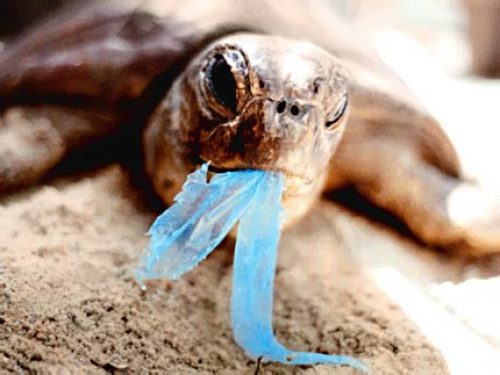Students Take on Plastic (S.T.O.P.) is an initiative borne out of the Ban the Bag Conference at the Hewitt School (NY) in 2013 and their follow-up student training on how to talk to lawmakers to encourage them to pass legislation that bans or places a surcharge on single-use plastic bags.
Single-use plastic represents one of many challenges to a sustainable future for our planet. Alliance students have shown that this is a challenge they are ready to meet head-on. In response to the request from schools to recreate this format in their own city or town, we offer this virtual handbook on how to help mobilize students to affect change in this important matter. This virtual handbook can apply both to single-use plastic bag OR bottles.
STOP is recognized as a Plastic-Free Campus Initiative by the Plastic Pollution Coalition, which is crowd-sourcing other effective plastic waste-reducing campaigns and programming. Young people deserve a seat at the table in deciding their future, and S.T.O.P. provides them a template for citizen action they can implement immediately.
STEPS TO IMPLEMENT A "S.T.O.P." EVENT IN YOUR SCHOOL OR COMMUNITY:
HOST A CONFERENCE ON THE ISSUE
The first conference should be to inform the general public and schools about either the plastic bag or plastic water bottle problem. Participants should include at least one faculty member from the schools that students sign up from). The event should be co-produced by students, faculty, and staff (it helps to have a communications person helping with outreach), and the panel should be moderated by the students.
Step 1. Join the Green Schools Alliance
So you can be included in any already existing coalitions around the issue (such as BagItNYC or equivalent environmental coalition for your municipality) or Plastic Bag Laws who will send you updates via the Alliance on any future public hearings and press conferences. This is where the students can deliver the one-minute testimony they prepared during Training Day.
Step 2. Decide on a date, time, format
Invite Panelists. It always helps to include a variety of stakeholders on the issue, including representatives from the Material Recovery Facilities that handle waste and sanitation, members working in the mayor's office, non-governmental organizations, lawyers, city council representatives, and activists around the issue.
Sample letter to panelists: "The Green Schools Alliance and the XX School are hosting a conference on XX, 201X of the (city) schools (both public and private) to support a (ban or fee) on XX in (city). Our goal is to empower students and provide them with the tools that they need to convince the city council that an ordinance to ban or impose a fee for X would be in the best interests of all members of the community. The conference will feature the viewing of the documentary, “X”, followed by a student moderated panel of experts like yourself who have experience with banning initiatives. (name any people already confirmed as members of the panel, and mention any member of the Alliance that suggested the panelist)."
Step 3. Invite Schools to Participate
- Create a registration page that explains the event. (sample from 2013)
- Invite schools and students via social media and listserves.
Step 4. Get the Word Out
- Launch a Petition if your town doesn't already have one. Petition cards can also be distributed at the school with a collection box.
- Vendor Endorsement sheets should be made available or distributed.
- Information sheets about the issue should be distributed (and also used during student training day).
- If legislation was introduced, make this bill readily available.
- Twitter/Tumbler #tag campaign
- Distribute a Press Release
- Distribute Flyers
- Write panelists with link to registration page and review of schedule, who else will be on the panel, and thank them for promoting it to their lists.
Step 5. Hold the Event
Begin with a screening on the topic prior to or the morning of. Three good ones:
Following the screening, speeches, and panel, students and adults break-out into groups. Adults participate in a workshop on how to campaign. Students discuss how they could be a real force on the issue, the reasons for supporting a law or rule disincentivizing use of plastic bags or water bottles, strategies for launching the initiative to all Green Schools Alliance members, and next steps to convince city council. Food and snacks should be provided.
Collect signatures via cards or a sheet. Distribute Vendor Endorsement Forms to all attendees.
Step 6. Activate and Spread the Message to Amplify the Impact of the Conference
Attend any hearings or press conferences around the issue. Add your school name to any community leaders' efforts to change council member(s) position.
Post videos, photos, and News Story on the GSA website and on your social media so that we can help share the news and grow support for legislation or Plastic-Free Campuses.
Announce results of the pledge, conference, and other actions in school assembly (number of schools/students attended, signators of pledge, status of the municipal bill up for a vote)
To hear about other successful initiatives to eliminate plastic bottled water from school campuses, click HERE.
HOST A FOLLOW UP STUDENT TRAINING DAY
The purpose of this important event is to train students on how to speak to their council members and at city hall when a bill is introduced. This is best hosted by the same school that hosted this initial Informational conference. This day consists of speakers and entertainment (example, in NYC the training speakers such as NYC Deputy Commissioner for Recycling and Sustainability, a city council member; and rapper/emcee AshEl Aldridge; showing of AshEl's Plastic State of Mind, a YouTube video gone viral).
Select judges and trainers, THEN FOLLOW STEPS LISTED FOR ABOVE CONFERENCE. To see how the Hewitt school did theirs, CLICK HERE.
On the day of the training day, following opening speeches, screenings, and entertainment, students break into small groups to work with environmental activists as coaches (2 per room) to produce one-minute mock testimonies they can deliver to their lawmaker or at a public hearing. Then they re-assemble in the auditorium so that the student with the most convincing (highest score by coaches) testimonial from each group presents his/her testimonial. Judges assign points on a scale of 1-5, scores are tallied, and the top 3 most persuasive testimonials are presented with a prize or ribbon.
MAKE AN APPOINTMENT WITH LAWMAKERS, DELIVER YOUR TESTIMONIAL AT PRESS CONFERENCES OR HEARINGS
As the bill accumulates supporters, give the undecided members a push. Call the council member to express your support for the bill. If no one is available, feel free to request a meeting with the council member to get your point across.
Send a letter or personal email. If you see your Council Member on the support list, call/write to say you support his or her position. Council members will be pressured by plastic lobbyists to change their votes. We need every member to stay on board for the law to pass.
Sample language for city council people if undecided:
My name is [NAME].
I am a constituent in your district and live at [ADDRESS].
I would like to express my support of the Lander-Chin bag bill and I request you sign on as a co-sponsor. The bill would require retailers to charge 10 cents for carryout bags (which the retailer keeps) to reduce the environmental impact of the bags as well as reduce the cost to taxpayers of the carryout bag disposal. I would like to schedule a brief meeting to talk with the council member about the legislation. Thanks for your time.
Sincerely, [your name]
Sample "thank you language" if your district already:
Dear Council Member XX,
I'm writing to thank you for joining the # other City Council Members for supporting a law that would put a 10-cent charge on paper and plastic carryout bags in [city], which was introduced in the City Council on [date]. I hope you hold your position on this issue, even in the face of pressure from plastic lobbyists. I have been polling vendors in my neighborhood and once they understand that (list conditions), they support it. Sincerely, [your name]
Continue to collect Signatures via cards or sheets. Continue to collect signatures of support from retailers.
CREATIVE IDEAS TO DRIVE HOME THE MESSAGE
Print STOP T-shirts, reusable bags or reusable bottles. If you are hosting a STOP Bags & Bottles event, then select and sell bags with a pocket for a reusable bottle.
Create or rent Bag Monster costumes for students to wear outside of their school building on the day of the event to attract (and entertain) a broader audience.
Create a canopy of curtain of bags installation across one of the rooms or a corridor in your school representing the number of bags used in your town each day/week/month etc.
Bottled water sculpture representing amount consumed each day/week/month etc.
ADDITIONAL RESOURCES
There are many examples of successful campaigns to get plastic bottled water out of schools and communities, and the below links is just to get you started. Please email info@greenschoolsalliance.org with any additional recommendations.
WATER BOTTLE FREE CAMPUSES AND COMMUNITIES RESOURCES:
Unbottle Water Campaign (NewDream.org)
Take Back the Tap
Rethink the Drink
Divide in Concord
PLASTIC BAG FREE COMMUNITIES RESOURCES:
PlasticBagLaws.org (authored by Jennie Romer, co-curator of S.T.O.P)
Plastic Bag Regulations Worldwide (map with hover for more info)
FACTS, MYTHS, MISCONCEPTIONS:
Reusables vs Disposables
Use & Toss Plastic Bottle Facts
Facts about the Plastic Bag Pandemic
Infographic about Bottled vs Tap
The Facts on Bottled Water
Bottled Water or Tap: How Much Does Your Choice Matter?
SHORT VIDEOS TO STRENGTHEN YOUR CASE
Bags: We use 4 of these a day and they're kind of the worst (bags)
Plastic State of Mind
Story of Stuff: Story of Bottled Water
Edward Norton: Bag the Bags
Plastic Free Times Video Library
Plastic Pollution Coalition Video Channel
Gloop, A Fairy Tale about Plastic
Water Truth (humorous case against single-use plastic bottled water)
TED Talk by GSA Member Green School in Bali about Bye Bye Plastic Bags Campaign
Webcast: Recycling 2.0-Changing Consumer Behavior Amid Changing Waste Streams
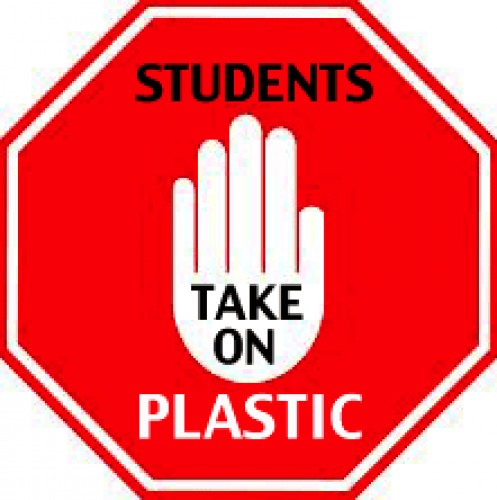

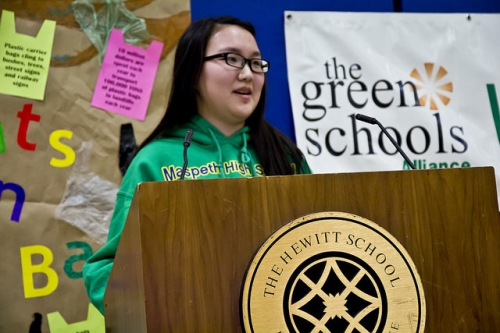
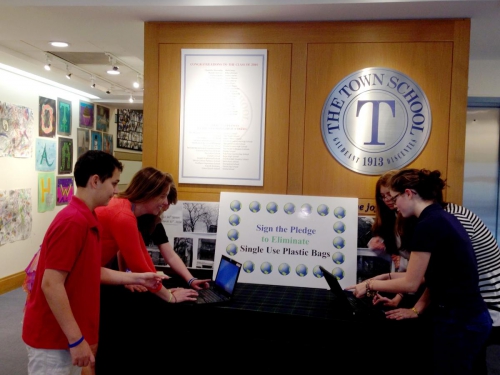
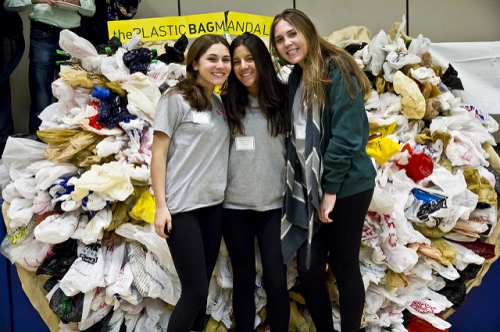
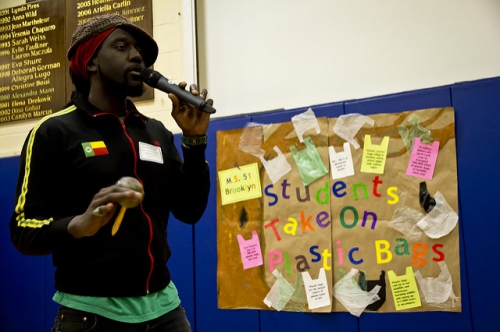
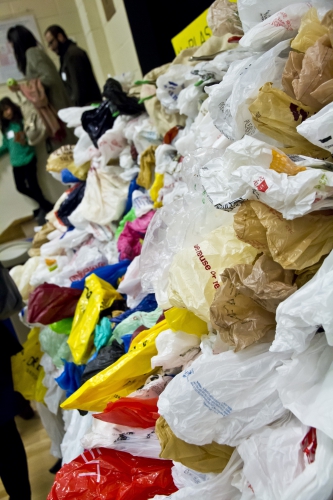
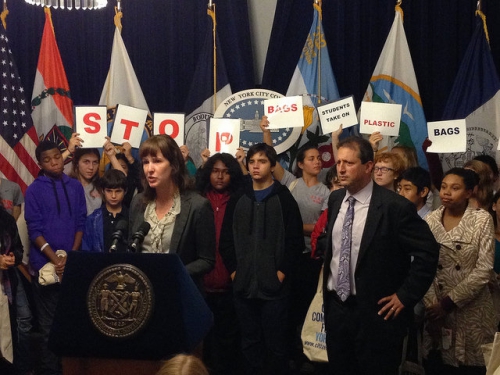
SOBERING STATISTICS
Plastic Water Bottles:
The average American family of 4 uses 56 plastic water bottles per week. That's 1500 water bottles consumed every second, 2 million bottles consumed ever five minutes, and 22 -29 billion plastic bottles annually. Recycling 1 plastic bottle can save enough energy to power a 60 w CFL for 6 hrs. The US consumes 60% of world’s water bottles even though our country’s tap water is safest in the world, and we make up only 4.5 of world’s population. Only 1 in 6 bottles gets recycled. It takes 3 times to volume of water to manufacture 1 bottle of water. 1/4 of a bottle of oil to manufacture the same size plastic bottle. 17 million barrels of oil a year to manufacture all the bottles we use in a year; enough to keep 1.3 million cars running for a year. Not to mention the fuel it takes to deliver the bottles.
Americans use and dispose of 100 billion plastic shopping bags each year. At least 12 million barrels of oil are used per year in the manufacture of those plastic grocery bags. Less than 5% of all plastic grocery bags are recycled. That means that every year 80 billion plastic bags end up in our landfills, our rivers, and our oceans. The Great Pacific Garbage Patch is an area larger than the state of Texas filled with plastic waste. The plastic still never goes away; it just becomes microscopic and may be eaten by tiny marine organisms, entering the food chain. Let's stop being part of the problem and become part of the solution!
